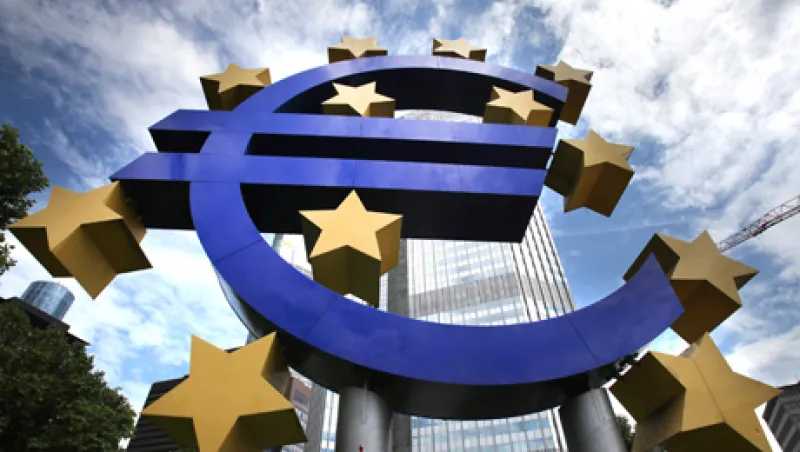The Eurozone governments agreed to bail out Greece in July. So why hasn’t it happened yet?
Blame three phenomena: The darkening economic horizon, threatening domestic political conditions in several Eurozone countries and a determination to exert as much pressure as possible on Athens to undertake the economic reforms they believe are needed for it to maintain its membership of the European single currency.
Even in July, when European leaders reached agreement in principle to negotiate a second €109 billion Greek rescue, the economic outlook, while deteriorating, had not become as menacing as it is today.
The chief economist at the International Monetary Fund, Olivier Blanchard, underscored the shift at a press briefing in Washington today. He said that recently the global economy has “entered a dangerous new phase; the recovery has weakened considerably and downside risks have increased sharply.”
The IMF has significantly downgraded its economic forecasts for both the Eurozone and the United States. Some senior Eurozone policymakers worry that a recession is looming. “The recession which may be coming is complicating the negotiations with Greece,” according to a senior European Union official actively participating in the discussions.
But for Eurozone officials, the deteriorating economic outlook makes it even more important to pressure Greece to make the politically difficult, growth-promoting, economic and social reforms which it committed to but failed to implement when it turned to the IMF for help in 2010. They fear that if they relax the pressure on Greece, other Eurozone countries, including Italy, (which is also drawing on Eurozone financial support) will also back away from reform programs they have promised in return for financial support. The European Central Bank, the International Monetary Fund and the European Commission (“the Troika”) are leading the bailout negotiations with Greece, Ireland and Portugal. The ECB is taking the lead in supporting Italy.
In the past few days there has been evidence that intense political pressure has contributed to a change of heart in Athens. At the weekend, George Papandreou, the Greek prime minister, cancelled a planned visit to the annual meetings of the World Bank and the International Monetary Fund in Washington in order to remain in Athens to work on the more rigorous reform package.
This followed a weekend meeting in Poland, the first ever to be attended by an American Treasury secretary (Timothy Geithner), where Eurozone finance ministers had told the Greek finance minister Evangelos Venizelos, that his government’s economic reform proposals were too weak to trigger release of the billions of euros of financial support needed to prevent Greece defaulting on its debts.
Domestic politics in several Eurozone countries have also been playing an important role in the negotiations to bail out Greece. Unlike the first Greek rescue package agreed in May 2010, the second is being prepared with the full participation of the European Financial Stability Facility, the Eurozone’s official bailout vehicle which was created in the wake of the May crisis.
Eurozone governments agreed on July 21 to give the EFSF stronger powers and greater financial muscle. Although parliaments in a few of the seventeen countries in the Eurozone, including France, have voted to back the enhanced powers of the EFSF, several have yet to follow suit, including Finland, Holland and Austria.
Arguably the most critical vote to approve strengthening the EFSF, in the German parliament, is not scheduled until September 29. Germany is the Eurozone’s biggest economy and so its support is vital to the financial viability of the enlarged and strengthened EFSF. Some other Eurozone countries’ parliaments will not vote on the EFSF until early or mid-October. This protracted approval process also helps to explain why Eurozone leaders have postponed a decision on releasing more aid to Greece.
Although some suspect that Greece’s Eurozone partners are deliberating playing up the opposition within their countries to the bailout in order to put extra pressure on the Greek government, the fact remains that providing support for Greece is deeply unpopular in several countries.
Particularly in Germany, where the coalition government has been weakened by internal disputes over the Greek bailout, governments do not want to take the risk of approving another Greek rescue until they are more confident that they can tell their electorates that Greece is indeed taking the tough economic decisions being demanded of it.
They also want to be sure that private sector banks, which have said that they will contribute to the bailout, will do so in sufficient numbers to make a credible contribution to the rescue. This is not yet certain. Were the banks to baulk at participation, this would not only put pressure on euro area governments to contribute more, it would also make the whole Greek bail out process even more electorally unpopular.
The delay in finalizing the creation of the beefed up EFSF is severely weakening the Eurozone’s capacity to contain its sovereign debt crisis, its critics say. It is, they argue, encouraging financial market speculation against other Eurozone countries, including, crucially, Italy, the Eurozone’s third largest economy, which is widely seen to be too big for the Eurozone to save.
The United States, in particular, fears that the Eurozone needs to be able to intervene more aggressively in Italy’s sovereign bond markets in order to prevent the debt crisis overwhelming the country, with potentially catastrophic consequences for several big Eurozone banks (big holders of Italian government bonds) and so for the world economy.
The Eurozone has acted to support Italy. On August 8, in a deeply controversial move which divided its governing council and may have triggered the subsequent resignation of Juergen Stark, its German executive board member, the ECB began purchasing Italian (and Spanish) government bonds to stabilise its sovereign debt market.
But the United States sees the sums deployed by its Securities Market Program, just over €140 billion so far, as grossly inadequate to fight financial market speculation. The IMF is worried too. “(Eurozone) policymakers are behind the markets,” Blanchard said today.
Blanchard also repeated calls from the recently appointed managing director of the IMF, the former French finance minister Christine Lagarde, for Eurozone countries urgently to strengthen the loss-absorbing capacity of weaker Eurozone banks by demanding they increase their capital, if necessary through the mandatory injection of public sector funds. Blanchard said he was worried that banks might otherwise strengthen their capital by a reducing their lending, so further weakening the economy.
For the IMF and its new managing director, the Eurozone crisis is turning into a test of its global influence. A leading player in the drama, it is providing not only money to support the bailouts of Greece, Ireland and Portugal; it is also deploying its expertise in the design and monitoring of the economic reform program and putting its own credibility on the line.
Lagarde is under pressure to demonstrate to her colleagues internally, and to emerging market economies who did not want another European running the IMF, that while she, too, may be a European she will take as hard a line with European countries calling on the IMF for support as it did with Asian countries in the regions debt crisis in 1997-8.
Her calls for a re-capitalization of weaker Eurozone banks will also play well in Washington, where Obama administration officials are deeply frustrated that European governments have not acted more decisively, as they believe the United States has, to strengthen the banking sector.






